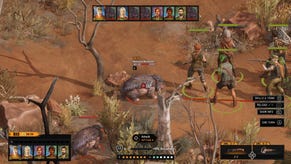Wot I Think: Rigonauts
Rig Rolled
Rigonauts is a game of 2D building and playful physics. In it you construct a rig, adorn it with weapons, and then let it lurch into battle against rickety enemy constructs. But is this experience worth a few quid? And why can't I stop playing it? Here's Wot I Think.
Rigonauts tells the tale of things called Hobs - goblins, basically - which ride around on contraptions armed with projectile weapons. The hobs encounter numerous enemies on their journey, and they too travel on large frames of multi-material scaffolding, brimming with cannons and lasers. You, of course, have to build the Hobs' rig, and to successfully set up its weapons, defenses, and plan of attack, so that it defeats enemy rigs when you let it go. Once the action starts, you have no further influence, you just set it in motion, and see what happens.
What happens, initially, is that you flatten the enemy rigs. But things soon escalate in complexity. First you learn that different building materials have different damage properties - wood is weak to fire, for example, while bone is weaker to physical impacts - and then you learn that developers Engient are extremely inventive with the tools they have created. Vast, complex puzzle-vehicles trundle towards you, spewing out mortar fire and bullets, and it's down to you to work out how to cripple and destroy them.

The first aspect of this is actual construction of your rig. This is pulled together from various building materials, the types of which are unlocked as you play through the campaign. While it's possible to build something fairly elaborate, especially in the later stages, you get points for efficiency, and the few guns or planks you end up using, the faster you'll earn enough stars to unlock the later levels.
The second aspect is choosing where your gun crews will focus their fire. Without direction, they will fire at the enemy hub, and likely fail. As you play you learn to seek out series of weak spots, to allow the fastest, most efficient end to an enemy rig. There's an art to this, and it becomes fascinating to struggle with. By the time you graduate to pinning balloons to the rig so that it can float, you have a good grip on what may or may not work in taking down an enemy structure. It's at this point that inconsistency begins to raise its head. Engient's designs are always very ingenious, but the difficulty is often wild. Rather than teasing you on each level, there are often spates of levels which you can ace first time, followed by others where nothing is clear. It's not a major issue, but it feels uneven - the difficulty curve is more of a wave.

There's also a limited number of levels to burn through, and anyone playing Rigonauts is likely going to be hungry for more once the game is done. Some kind of level-editor and level-sharing marketplace seems like the next logical step for this game, but it does not yet exist.
It is, I suppose - and I teeter on the precipice of obviousness as I say this - a sort of Angry Birds for battlewagon and airship enthusiasts. Not that I really feel comfortable with drawing a direct comparison between the popular avian physics pinger and this build-and-release contraption editor, but it's probably worth saying: if you want tinkering and thinking and collapsing structures, then you'll be well served here. In the same way that Angry Birds presents you with quickfire problems, that sometimes need to be gnawed about before the solution appears, so Rigonauts proves intensely playable through constant slight change of the problem that it presents you with.
It's that rapid modulation that makes this sort of game so satisfying. They stretch your mastery on a level by level basis, allowing you to engage in that most time-consuming of gaming processes - tinkering with variables - while also changing the problem that the tinkering is aimed at. Rather than being a game where you rely on having pumped up your stats, or developed a skillful understanding of the parameters for success, it's an ongoing building process. This is why any comparison with the simpler, bird-based puzzlers does not hold up. They are simply about reading the thing that needs to be destroy. In Rigonauts you also need to read the attacks being made against your craft, and adjust accordingly. It's a fascinating challenge.
So fascinating that I'm being dragged back into the swirling vortex of slightly adjusted gun placements even as I write this. Yeah, you might baulk at the seven quid this currently costs on Steam, and perhaps rightly so. Rightly so because this is a game that has been made with a view to getting it to work on tablets and so on, not just Steam. A game like this needs a little more on PC. It needs that editor. It needs a versus mode. So you might wait for a sale. Meanwhile, I'll just be obsessively tinkering.
Rigonauts is out now on Steam.










